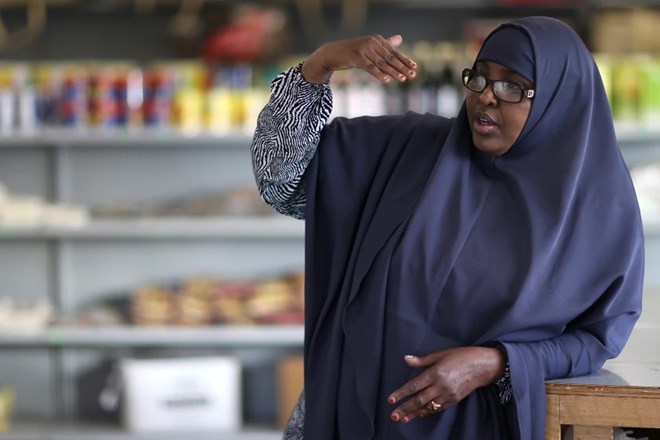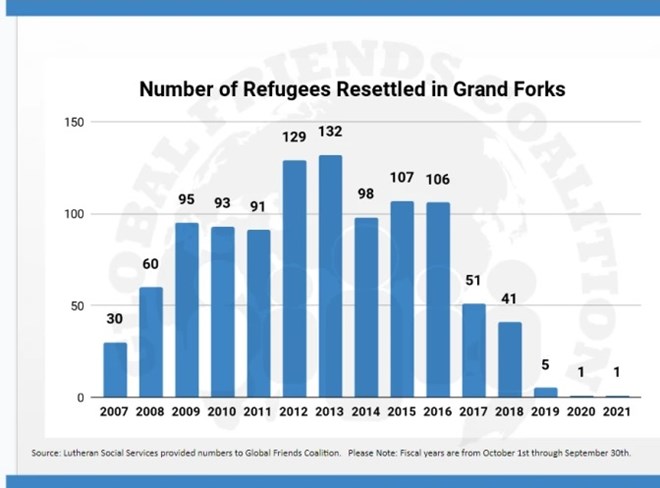
Saturday October 8, 2022
By Meghan Arbegast
Sainab Yussuf, who runs the Safari Market and Restaurant on Gateway Drive, said business has been down as she has noticed Somalis moving to Fargo, Moorhead and the Twin Cities.

Safari Market owner Sainab Yussuf is shown in this Grand Forks Herald file photo.Eric Hylden/Grand Forks Herald
GRAND FORKS – The number of Somali immigrants leaving Grand Forks to move to other cities has taken a toll on some local businesses.
Sainab Yussuf, who runs the Safari Market and Restaurant on Gateway Drive, said business has been down as she has noticed Somalis moving to Fargo, Moorhead and the Twin Cities. In Grand Forks, Yussuf said, there isn’t a community for Somali people.
“They said they’re getting more help over there and there’s more community over there than here,” Yussuf said of some who have left.
Another challenge, according to Yussuf: Finding a job when there is a language barrier.
“There is no translator person in the compan[ies] talking to them saying ‘OK, try to give these people more time. Let them do the job, see if they can do something about it.' Give them an opportunity or a chance,” Yussuf said.
Cynthia Shabb, executive director of the Global Friends Coalition, said Nepali-speaking Bhutanese immigrants also have been moving away, often to Pennsylvania and Ohio. Shabb said it's because health care models, which pay family members to help someone who needs assistance, are different in those states and there is a larger population of Nepali speakers.
Other barriers immigrants – often called “New Americans” – are facing relate to child care and housing. Shabb said many families with whom she works have part-time jobs, so they can take care of children. It means they probably don't have solid health care plans.
The number of refugees being resettled in Grand Forks has declined, too. This year, one refugee has been resettled here, the same number as last year and 2020, according to data supplied by Shabb.
In 2007, the number was 30. Numbers began to steadily rise beginning in 2008. But while the number of resettled refugees rose past 100 in 2012, that number declined steeply after 2016.
Shabb said the decline can be partially attributed to the closure of Lutheran Social Services of North Dakota, which was resettling upwards of 90 to 100 refugees in Grand Forks annually before it closed in 2021. She said other reasons could be the national immigration policies adopted in recent years, as well as the COVID-19 pandemic.
Lutheran Immigration and Refugee Services of North Dakota, based in Fargo, is now the resettlement site for the state. Shabb said LIRS is resettling refugees who have family ties or single cases in Grand Forks.

Shabb said the Global Friends Coalition and Global Neighbors, another nonprofit in the state, have applied to be a resettlement site for refugees in 2023. Both organizations should soon hear whether the proposal is accepted. If it is, Shabb said, she hopes that will increase the number of refugees being resettled in Grand Forks.
With fewer refugees coming to Grand Forks, Shabb said some of the resources offered by Global Friends have shifted.
“So it's not our typical going into a home and helping somebody navigate how to get groceries and figure out their mail, because they've been here longer,” Shabb said. “We're really moving into the full arena of integration — helping people become part of the community, like with a business and getting kids part of art camp and some of the mainstream things that people take advantage of in the community.”
Another organization in the community is the New Americans Integration Center, which Director Abdirisak Duale says was created out of necessity to provide services for the challenges that New Americans face.
The center offers food services, employment opportunities, transportation, translation services, English classes, COVID-19 awareness, social services, driver education, housing, citizenship help and a variety of programs.
Overall, the idea is to help New Americans become part of the community.
“We strive to integrate New Americans with the community,” Duale said. “To make them feel they belong here. That this is their home. Their lives, jobs and families are here.”